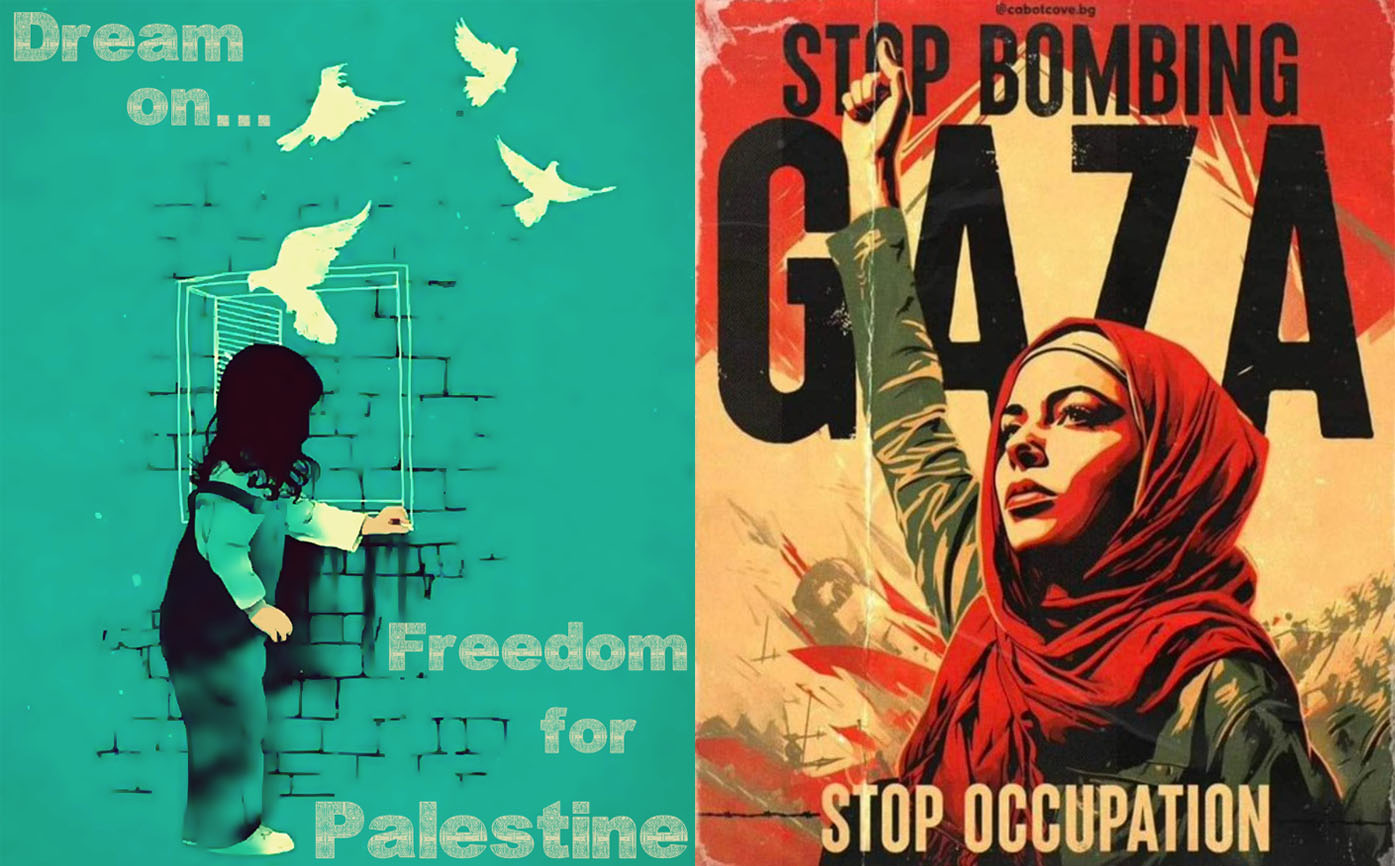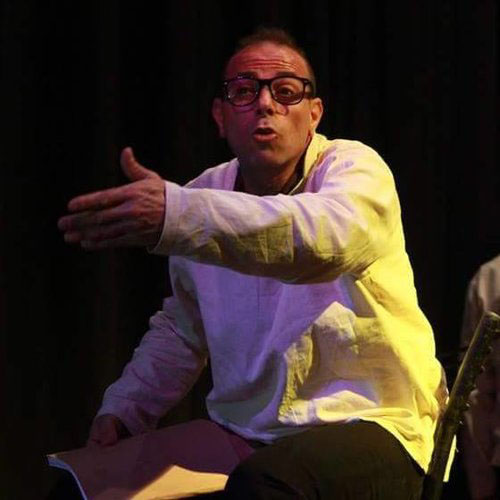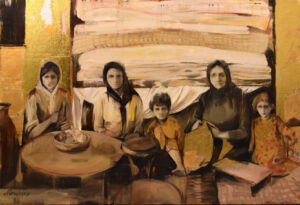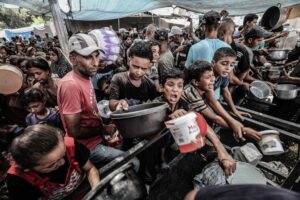Inside the nightmare that has become Gaza, from hospitals to Rafah — a first person account of survival inside the places carpet-bombed, shelled and sniped by Israeli forces.
Hossam Madhoun
Not a Diary, Just Statistics
128 days of war on Gaza.
35,176 people killed and missing under the rubble or not reached yet due to military operations.
28,176 killed people reached the hospitals, among them:
- 12,300 children
- 8,400 women
- 340 medical staff
- 46 civil defence personnel
- 124 journalists
7,000 people missing, 71% of them children and women.
67,784 injured, 70% of them children and women.
11,000 injured in need of treatment outside Gaza — dangerous injuries in need of life-saving treatment.
10,000 cancer patients facing death due to lack of treatment.
700,000 infected by contagious diseases.
8,000 infected with hepatitis due to displacement and malnutrition and unsafe water.
60,000 pregnant women are at risk due to lack of proper health treatment.
350,000 patients at risk of health deterioration or death due to lack of medication and proper health treatment.
2 million dispossessed people (internally forced displacement).
142 governmental facilities destroyed.
100 schools and universities totally destroyed.
295 universities and schools partially damaged.
184 mosques totally destroyed.
266 mosques partially damaged.
3 churches destroyed.
70,000 housing units totally destroyed (housing around 150,000 people).
290,000 housing units severely damaged (housing around 1,450,000 people).
66,000 tons of explosives hit Gaza.
30 hospitals are out of service because of the Israeli military attacks.
30 primary health care units are out of service because of the Israeli military attacks.
123 ambulances targeted and destroyed.
200 sites / buildings of architectural / historical interest — destroyed.
Hospital
In Rafah, there are no real hospitals, only four centers which are called hospitals, but are much less than a real hospital, a bit more like a primary health care center. One of them is a maternity unit only.
Last night my mother got very sick again, with uncontrolled vomiting causing internal bleeding. It’s nonstop: vomit mixed with blood comes out dark, the color of coffee, with pain. It started at 6:25 in the evening, there was nothing to do, it was dark … movement is very risky. No sleep at all, waiting for daylight. At 6:25 the next morning, I went to the nurse, the neighbor, who helped give my mother the medication through her veins. It’s happened twice since I arrived in Rafah, this is the third time. Normally as soon as she gets the medication, the vomiting stops.
I did not find the nurse at home, he’s on a night shift at the hospital and he won’t be back before 10 a.m. I am in a strange city and I don’t know enough. But I know Abu Khaled Abdelal. I approached him, asking for a doctor or a nurse to help my mother. Immediately he called a friend, an old, experienced nurse, Abu Wasfi. In less than 15 minutes he was here, he did what should be done, he gave her the medicine in her vein. The vomiting continued; I thought it would take some time until it worked but it did not work this time. It was now 11 a.m., and she was still vomiting and bleeding. No choice, I must take her to the hospital. The hospital was not the first choice because we all know that due to the huge demand on hospitals, the huge number of injured people, and the collapse of the health system, doctors are obliged to prioritize to whom they give service. An 83-year-old woman will not be a priority.
I went to the hospital, entered the emergency room. It is so difficult to explain what it looks like. The emergency room is a hall of around 14 x six meters with 20 hospital beds. Hundreds of people in the place, all beds are occupied, many patients are on the ground, doctors and nurses are moving everywhere treating injured people and sick people wherever they are, on beds, on the ground, in the corridor. The floor is very dirty, needles, cotton balls, and bandages full of blood, dirt, spilt water, making the place dirtier. All the while there are two workers cleaning, doing their best to collect whatever they can, yet the place is a mess.
The noise is a mix of cries of pain, shouts of people calling doctors to take care of their beloved ones, talks, chats, electronic sounds of medical machines. After more than 30 minutes, I was finally able to talk to a doctor about my mother. She was in her wheelchair, and he walked with me while I was explaining her situation and what we gave her. He looked at her, and then approached a nurse asking her to take some blood from my mother for CBC and chemistry tests. Then he left, the nurse was busy with other patients and injured people, she came back after 20 minutes, checked my mother’s blood pressure, and she inserted the cannula in her vein, took the blood sample and asked us to take it to the lab. The doctor came back 20 minutes later, he checked my mother’s chest, and he asked the nurse to give my mother some medication through a vein.
After two hours, the blood test results came back, there is inflammation in her blood, we need a specialized doctor to decide the right medicine. They ask us to wait until he comes; they said he will be there in ten minutes. One and a half hours passed, and no one showed up. I kept asking about the doctor who was supposed to check on my mother, but no one had any answer, they don’t know, maybe he is in another section, maybe he left. I searched for him in all the hospital sections but could not find him. All this time my mother was becoming weaker and more tired. She wanted to leave, she could not stay in the wheelchair anymore, it was so painful after more than three hours.
Finally, we decided to leave. My mother hadn’t vomited for an hour and a half, so we hoped for the best and decided to look for a private doctor tomorrow.
While I was there at the hospital, three injured people died; two were severely injured, and the third had internal bleeding, while the outside of his body was not hurt.
It is 9:32 p.m., I am writing this piece and my mother is on her bed, again vomiting and barely able to breathe.
The Last Shelter / The Last Resort
“Civilians will not be harmed. We do not intend to harm civilians. This is a war against terrorists. All civilians must leave Gaza City and the north of Gaza and go to the middle area and the south, to Khan Younis and Rafah. These are the safe shelters.”
From most of Gaza City and the north, more than a million people left for what was called “safe shelter.”
The middle area, the south, Khan Younis and Rafah. Were they really safe? Bombing and airstrikes followed the civilians, leaving thousands dead and huge destruction.
A month later, all civilians in the middle area were required to go south to Khan Younis and Rafah, safe areas, safe shelters.
People fled from the middle area, dispossessed, forced to leave, to survive. They saw what had happened to those who did not leave Gaza City and the north.
But Khan Younis and Rafah were not any safer. Killing, bombing, shelling, airstrikes followed them, again leaving thousands dead and huge destruction.
A month later, all civilians had to leave Khan Younis and go to Rafah. Rafah is safe.
More than two thirds of the Gaza Strip population is squeezed into Rafah. The last resort, the last safe place for the civilians of Gaza. Is it really safe? Still bombing, shelling, airstrikes follow people, leaving thousands of dead and huge destruction.
Last night was an example of what’s coming to Rafah. One hundred and sixty-two people killed in two hours, as usual the majority women and children.
People are stuck and paralyzed. People have no choice at all.
Since they began talking about invading Rafah, the city changed; the market is less crowded, there are fewer street sellers, no one is moving once dark comes.
At home, most of our talk is about what to do, where to go. Shall we stay? Shall we move again? But to where? And we end the conversation without any answer. We are stuck.
Everyone I meet raises the same questions: “Are you staying?” “Are you planning to leave Rafah?” “Where would you go?”
I don’t know.
We called our daughter Salma, who is in Egypt now. For more than fifteen minutes she was only crying, afraid for us, and we are afraid too. She asks the same questions, and we could provide no answers.
We don’t know.
Why should any human being have to go through this horror? Why?
Rafah is the last city, the last resort. Then the border with Egypt; the border with high walls, huge barbed wire, many observation towers, no access.
Now they call for a military operation in Rafah. Where will people go?
The terrifying stories from Gaza, the north, the middle area and Khan Younis leave people in an unbearable state of panic.
People don’t know what to do, where to go.
In Rafah
2 a.m., sitting on my mattress unable to sleep, thinking of what is coming and all the threats to invade Rafah. The last few days, the bombing and the shelling of Rafah by the Israeli army increased.
It was silent and quiet since early evening when the silence was broken by airstrikes, intensified airstrikes on Rafah City, heavy shooting and shelling. How many people died and injured? How many houses destroyed by these strikes? I don’t know. I will know tomorrow from the news, if I’m not one of the dead.
I don’t know what’s happening. Did they start the invasion of Rafah? Despite all the warnings of all the world, despite the possibility of committing new, grave massacres? I don’t know. All that I know is that I am terrified, disabled, and have no choice.
The bombing, the shooting and the airstrikes continue while I’m writing these words.
When I opened the laptop half an hour ago I was planning to write something else. I wanted to tell you about something I heard a child ask his father.
The child said: “Dad, what if we stop eating so we get smaller and smaller until we become small enough to get into my mother’s belly and then you take her out of Gaza and she gives birth to us in a safe place where there is no bombing? Is this possible?”
We were five men there. We heard the child, we were astonished. Not one of us said anything.
The bombing, the airstrikes and the heavy shooting continue and I will stop now so I can send you this episode, just in case …
Empty Head, Full Heart
My head is empty. There is nothing in it, like a stone, closed, blocked, do not receive, do not send. My heart is full, can’t take the pain anymore, can’t be moved anymore. I am not going to talk about people I meet anymore, like my colleague, Shereen whom I met today for the first time since October 5th. I could not recognize her, very thin, very small, very dark face, the very best image of a broken human being. I am not going to tell any more about how many times she had to evacuate, from Beach Camp to Nasser Street in Gaza, from Nasser to Bureij Camp in the middle area, to Zawayda, to Khan Younis, to Rafah and with each displacement losing part of her family, losing part of her soul.
What am I doing? I said I don’t want to talk about these things. My head is empty and my heart is full, no more space for any sad stories.
I want to dream. Yes. I will dream. I dream now. I am dreaming that I am having a nice meal, a big meal, a meal with no canned food, only fresh food, fresh chicken, and a steak, a very soft, juicy steak of meat. Beside it, a big plate full of all types of fruit — bananas, apples, oranges, strawberries. And the dessert is a big cup of ice cream, topped with a shiny, red cherry. Yes, this is what I want.
I don’t want to think about the dead around me. I don’t want to know how many were killed today. I don’t want to know that there is no more blood to spare at the Nasser Hospital in Khan Younis and that injured people are bleeding to death. No, I don’t want to talk about people in Gaza City, more than 600,000 people are starving to death because the Israelis do not allow food aid to reach Gaza and the north. I don’t want to talk about people outside with no shelter, no food, no clothes, in the cold, under the rain. I don’t want to talk about the children who suffer hunger, pain, fear, panic and no one can assure them safety or secure them food.
I want to dream. I dream now. I am with my wife and my daughter driving on the sea road, having hot cups of good coffee, listening to music, recalling nice memories and laughing together, yes, together, myself, my wife, Abeer and my daughter, Salma, having fun, with no fear, no worries, just having a good time.
I am not going to talk about the hundreds of messages I receive every day from people I know and people I don’t know, asking for help, asking for a tent, or plastic sheets, or clothes for their children, or food, or any kind of life-saving items. I am not going to talk about my feelings when I receive these messages and I can’t meet 1% of these needs.
I want to dream, only dream, dream that I am waking up at 6.30 a.m. in my bed, in my home, taking my dog for a walk and then come back, have a shower, have my morning coffee, getting dressed and going to my job. Nothing more. This all I dream about.








































































































![Fady Joudah’s <em>[…]</em> Dares Us to Listen to Palestinian Words—and Silences](https://themarkaz.org/wp-content/uploads/2024/03/SAMAH-SHIHADI-DAIR-AL-QASSI-charcoal-on-paper-100x60-cm-2023-courtesy-Tabari-Artspace-300x180.jpg)
















































































